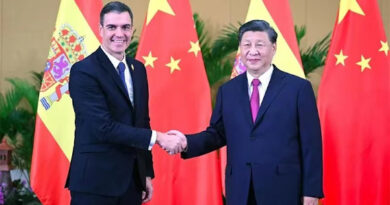The extreme right is already in power in the West
EUGENIO GARCIA GASCON
Being surprised by the irruption of the extreme right is already a thing of the past. The parties of this current, including those with Nazi sympathies, are abandoning the extra-parliamentary or parliamentary margins to become central and unapologetic actors in hitherto liberal countries, where they form essential vertebrae of power, as in the case of Italy.
The particularly choppy waters in September have also put the Sweden Democrats in the spotlight. DS does not hide its Nazi ideology or its rejection of the waves of immigrants from the third world, particularly Muslims, who, according to supremacists, are replacing the white and Christian Western population.
DS has exceeded 20 percent of the vote and is in a good position to play a decisive role in the next government. A part of its ideology is shared by other formations on the right, and in some cases not only on the right. It is inevitable to think that we are at the gates of an illustrative experiment in countries like Hungary, where populism already governs, or where populism has positioned itself to govern, as in Italy, which is happening in more and more latitudes.
A distinction between the present and the past is that these days the extreme right presents itself to the electorate as a democratic force, that is, one that respects the democratic character of Western systems, a characteristic that it shares with the populist and nationalist movements that roam freely in the West and whose ideas are often merged with the extreme right and are difficult to discern.
It is significant that DS includes the word “democrats” in the preferred place in his name, which suggests the extent to which Western societies are changing. The new ideologues of the extreme right, who previously relied on brute force to subvert the order, now place their hope in the support of the ballot box. This irony is no longer a mirage in Sweden or Italy.
The left is moving to occupy a residual position in the western political spectrum. Countries like France or Italy have relegated social democracy to a marginal box, as was seen in the last elections. There are few places left where socialist ideas are dominant, as is the case in Spain. One country that tends to get ahead of the others is Israel, where we see that social democracy and the left in general have been irrelevant for years in the face of the growing push of nationalism and religionism, two right-wing ideologies.
Populists, nationalists and religionists, they have not come out of nowhere. A first impression is that they respond to the changes that are taking place in Western societies, where a weariness of liberal democracy is perceived. Western societies seem exhausted, even in countries like Sweden, where social democracy had worked enviably for generations.
The insurrection of the right and the extreme right in the Capitol against the results of the last presidential elections in the US points in the same direction. The uncertainty is perhaps being resolved in the way that a conservative intellectual has predicted: "Before the smart kids were on the left and now they are on the right." Perhaps not all the smart boys are right-wing, but it is undeniable that there are more every day.
The phenomenon entails a polarization that feeds wide sectors of the right and the left. It is still difficult to determine whether the coup led by Donald Trump was actually a failure, that is, whether it marked the end of the movement or was the beginning of a broader populist movement that is in its infancy and will soon be dominant in the West. Giorgia Meloni, announcing his victory, insisted that the results of the Italian elections are not a point of arrival but a starting point.
Even in the less developed neighborhoods of the big Western metropolises, workers are voting en masse for the right and the extreme right. It occurs in cities in the United Kingdom, France, Spain or Italy, and in other countries. The feeling is that people have had enough of the enormous complexity that Western society has acquired. As a philosopher said, when complexity takes on extreme hues, people want to simplify. This is exactly what is happening and it is extremely dangerous.
It should be emphasized that in Sweden or Italy people are voting freely, with all that this implies. People support this twist. The impression is that the emerging populist and nationalist society is saying goodbye to the liberalism that has dominated the West for decades and whose appeal is a thing of the past and is questioned by more and more individuals. The lure of liberalism is giving way to enormous confusion. Society rejects the economic egalitarianism that turned Sweden into a center-left model, perhaps because our society is quite different from that of a few decades ago.
Historic bastion of tolerance, justice and social democracy, the overturning of Sweden is directly related to Nazism. Eighteen of the 30 founding fathers of the Sweden Democrats, who established the party in 1988, formed an Adolf Hitler-affiliated neo-Nazi group with the nationalist slogan "Sweden for Swedes." Its members used to exhibit themselves in military uniform, something that ended up being prohibited in 1995. The uniform was lost but not the tricks.
It would be arguable to attribute the extreme right-wing nationalist bias only to the leaders of the new parties springing up across the West. Certainly, those leaders promote it, but they would not be successful if there was not a broad popular base that supports and feeds those ideas, that supports them at the polls, and that is what is really worrying.
The Swedes are ending the egalitarianism that much of the world envied. Hospitals and schools are being privatized and the country has lost the immunity it once enjoyed against the extreme right and the extreme left. To aggravate this situation, some analysts point out that parties on the left and on the right are adopting different ideas from the Sweden Democrats, not only in relation to immigration. The conclusion is that polarization is worsening and expectations are not encouraging.
Eugenio Garcia Gascon is Cirilo Rodríguez journalism award. He has been a Jerusalem correspondent for 29 years.













